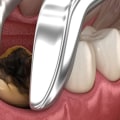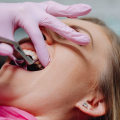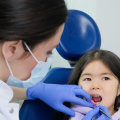Having a tooth extracted can be an uncomfortable experience, and it's normal to experience some pain and discomfort afterwards. However, if the pain persists for more than three days, it could be a sign that something is wrong. In this article, we'll discuss the causes of throbbing pain after tooth extraction and how to manage it. The most common cause of throbbing pain after tooth extraction is dry alveolitis. This condition occurs when the blood clot that normally fills the cavity is lost, leading to inflammation of the mandible (or alveolar bone).
Symptoms of dry alveolitis include throbbing pain two to four days after extraction, bad breath, and a bad taste in the mouth. Headaches, pain around the temples, neck or jaw, and sore throat may also be caused by swelling and should go away within 1 to 3 days. If you experience severe pain after a tooth extraction that lasts longer than three days, you should contact your dentist for an oral evaluation of the wound site. Over-the-counter medications such as ibuprofen can help control pain, as well as swelling and inflammation. Holding a cold compress (such as an ice pack wrapped in a towel) on the side of your cheek can also help reduce swelling.
Recent studies have also shown that the incidence of dry alveolitis in women decreases significantly when tooth extractions are performed during the menstrual period. Finally, it's important to note that if malpractice has occurred during a tooth extraction, you may be able to file a claim. If bacteria have invaded the tooth extraction site, it's likely due to gum disease.






